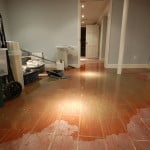Table of Contents
Basement Water Leak can be the source of floods.

Here are some causes of a Basement water leak:
- Foundation Leak
Basements can leak because the soil surrounding the foundation and the walls of a basement has become overly saturated. Often this occurs after a long rainy season, and particularly if it was preceded by a drought.
- Gutter Leak or Drainage Leak
A common cause of basement is leaking might have to do with the gutter system. Old and poorly installed gutters tend to promote pooling water and cause a build-up of standing water around the foundation of a home. The water will leak into a basement, eventually penetrating the walls and causing serious damage.
If water doesn’t have a direction in which to flow, it will settle against the foundation of a home and find its way into the lowest chamber: the basement. There should be a small grade of slope from a home to the street, allowing for smooth water flow.
Increase the chances of stopping leaks in a basement by decreasing the amount of water that comes near a home. If the basement is still leaking after checking these items, it’s good to consult a plumber. The reason for the leaks might be in your interior plumbing rather than from an outside source.
What to do if you suspect a Basement Water Leak:
Larger leaks or a combination of small leaks can often be detected by a simple water meter test. Here are the simple steps:
1. Make sure all water is turned off inside and outside the home. This test must be performed when no automatic water equipment is used, such as irrigation controllers, clothes washers, dishwashers, etc.
2. Record the reading of the water meter, and wait 15 minutes. Be certain no water is used during this time.
3. Record the reading of the meter again. If the meter has recorded water use during the test, it might be due to a leak. Verify that the water use is not due to small appliances such as water filters, water softeners, or whole house humidifiers.
The meter test verifies large leaks. This test does not verify small leaks that exist within the home. Additionally, when leaks are detected, this test does not indicate the location of the leaks. Further investigation is needed to detect and locate all significant leaks.
Water Supply Line Leaks
Sometimes there are leaks between the meter and the home, in the water supply line. These leaks are often difficult to detect because the supply pipe is usually buried at least 3 feet (.91 m) below the ground. Sometimes the leaking water will travel along the pipe, and back to the meter. If the meter box contains water, and the water is not due to rain or irrigation run-off, this may be an indicator there is a leak in the supply line. Another common exit point for the leaking water might be where the supply line rises above the ground and/or enters the house. If the soil is constantly damp at this location it might indicate a leak. In the case of a severe leak, the water will seep towards the ground surface, usually directly above the path of the underground pipe. Most often, leaks between the meter and the house are the responsibility of the homeowner; leaks from the meter or pipes leading from the main to the meter are the responsibility of the water utility. The water utility should be contacted before any attempt to repair the water supply pipe. If the utility deems the leak to be the responsibility of the homeowner, a professional licensed plumber should perform all repair work.
Call Carter’s My Plumber at 317-859-9999
If you suspect you have a basement water leak, call a professional plumber who does leak detection. It’s important to have the problem thoroughly diagnosed and get the proper solution to prevent a flood. Call Carter’s My Plumber today for a Licensed Plumber.



